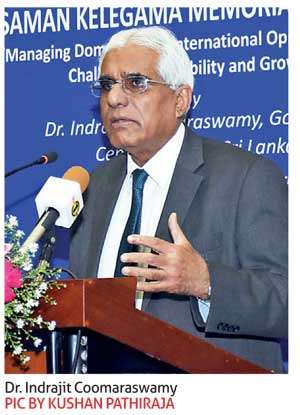26 Jun 2018 - {{hitsCtrl.values.hits}}
By Nishel Fernando
Sri Lanka will no longer be able to finance the repeating cycles of flawed economic policies as the country’s access to concessionary loans has become “very limited”, given its lower middle-income status.

Delivering the inaugural Dr. Saman Kelegama memorial lecture titled ‘Managing Domestic and International Opportunities and Challenges for Stability and Growth’, in Colombo, yesterday, Central Bank Governor Dr. Indrajit Coomaraswamy stressed that Sri Lanka needs to break the repeating cycles of inappropriate polices.
“If you look at the post-independent era, we had 15 IMF programmes, while only two had been completed. I don’t know any other country, which had this many IMF programmes,” he said.
Dr. Coomaraswamy noted that Sri Lanka also had two of these cycles in the immediate aftermath of the end of the 30-year war and in early 2015. Both of these cycles led Sri Lanka to seek the International Monetary Fund (IMF) assistance in 2012 and 2015.
“This kind of repeating cycle of inappropriate polices has been kind of the vein of our macro-economic management.”
However, the governor pointed out that while the outlook has changed since Sri Lanka graduated from the lower income status to lower middle-income status.
“In the past, when we were about to have a BOP crisis, we had a mix of concessionary loans. However, we have very limited access to concessionary loans now. Today international capital markets are not going to do any favours. If they think we are no longer credit-worthy because our macro-economic fundamentals are deteriorated, they will stop lending.”
Dr. Coomaraswamy warned that bad policies could lead to a financial crisis and it would be far more delinquent and create a devastating social and political impact similar to that of Greece and the countries that faced the 1997 Asian Financial Crisis.
“Financial crises are very different and far more painful,” he stressed.
He noted that the government is currently in the process of institutionalising the macro-economic framework in order to make sure the policies are in effect beyond the expiration of the on-going IMF programme.
He insisted, as Sri Lanka has graduated to the lower middle-income status, the island nation needs to get away from the toxic combination of populist politics and deeply enthralled entitlement culture and pointed out that this is probably the best change Sri Lanka has got to develop its economy in decades.
Meanwhile, speaking of the additional borrowing cost arising from the normalisation of the monetary policy in the U.S., Dr. Coomaraswamy said, “It will certainly increase the cost of financing in international markets. But what we have to do is get the policies into a better shape, so we can drive down the risk premium attached to the Sri Lankan economy. If we can strengthen the macro-economic framework, we can drive down risk premium, so there won’t be a significant increase in the borrowing cost to the country.” The governor also stressed that Sri Lanka needs to push ahead with the stabilisation process along with structural reforms. He pointed out that Sri Lanka’s growth framework hasn’t improved due to the slow implementation of structural reforms.
Dr. Coomaraswamy highlighted that Sri Lanka’s ageing population poses a challenge to the growth outlook as the country is not able to rely on labour augmentation to boost growth.
“We are on the cusp of ageing population at a much earlier stage of our development process. What are the implications of that? It means that simply you can’t drive the growth through labour augmentation. It means we have to work much harder driving productivity increasing total factor productivity. So innovation, R&D and all that becoming much more important because we are facing much tougher challenges achieving growth,” he said.
22 Dec 2024 52 minute ago
22 Dec 2024 1 hours ago
22 Dec 2024 4 hours ago
22 Dec 2024 4 hours ago
22 Dec 2024 4 hours ago